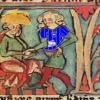| Chartism 18:49 - Jan 25 with 1157 views | jeera |
Likes of Guthers and Unbelievablue maybe?
I wonder of one of you fine people could just give me a brief run down what exactly was 'in it' for the various classes?
I can see in the 6 main points of the Charter the reasoning for the middle classes wanting more power/say so; I suppose the vote would be an obvious point.
Better access to the political system itself? I.e. only the wealthiest could become an MP etc?
But the movement itself contained a right mixture of people from various backgrounds and much of the drive seemed to come from a want for more equality. Well that's understandable from the view of 'have nots' but why would the middle classes side with the poor? Much outrage because of the Poor Law amendment et al, not just from those who suffered because of it.
Was the simply a human element to it? The likes of Cobbett for example, just a jolly decent chap?
Basically, the push behind it seemed to have the working classes and poorer in general at heart, industry etc, but the 6 points of the charter itself appeared more to be directed towards the kind of goals the middle classes may have desire.
Advise s'il vous plait.
|  |
| |  |
| Chartism on 19:56 - Jan 25 with 1096 views | EdwardStone |
Not really answering your question.... but here goes
I live in a small village north of Gloucester
As well as the usual mish-mash of houses built thru' the ages, it also has a significant number of bungalows built by the Chartist movement, in particular by one Fergus O'Connell
The legislation at the time said that you could only vote if you owned property.... the Chartist campaigned to have this changed.
But our Fergus walked a different path. In order for everyone to have a vote, all he needed to do was build everyone a house...ergo they would then have a vote
So he set to, built some number of settlements and then anyone could enter a lottery to be given a house, with acres of land, to live the "Good Life" of self sufficiency and be able to vote.
So the unwitting winners would be plucked from their urban hell and just dumped in the countryside and told to get on with it.....
They grew fruit and veg, raised livestock and were supposed to sell the surplus
I imagine the conversation with a Chartist neighbour might be something like this......
"Hey Neighbour, can I interest you in purchasing 6 bushels of ripe tomatoes what I have grown??"
"No thanks. May I interest you in purchasing 6 bushels of ripe tomatoes what I have grown??"
"No thanks"
Etc, etc as the seasons roll past
Bloody audacious plan, build everyone in Britain a house....
Didn't really happen though
Anyway, early heads up.
Annual BBQ in June chez moi... come and eat the burgers and visit the history if you wish |  | |  |
| Chartism on 20:02 - Jan 25 with 1079 views | jeera |
| Chartism on 19:56 - Jan 25 by EdwardStone |
Not really answering your question.... but here goes
I live in a small village north of Gloucester
As well as the usual mish-mash of houses built thru' the ages, it also has a significant number of bungalows built by the Chartist movement, in particular by one Fergus O'Connell
The legislation at the time said that you could only vote if you owned property.... the Chartist campaigned to have this changed.
But our Fergus walked a different path. In order for everyone to have a vote, all he needed to do was build everyone a house...ergo they would then have a vote
So he set to, built some number of settlements and then anyone could enter a lottery to be given a house, with acres of land, to live the "Good Life" of self sufficiency and be able to vote.
So the unwitting winners would be plucked from their urban hell and just dumped in the countryside and told to get on with it.....
They grew fruit and veg, raised livestock and were supposed to sell the surplus
I imagine the conversation with a Chartist neighbour might be something like this......
"Hey Neighbour, can I interest you in purchasing 6 bushels of ripe tomatoes what I have grown??"
"No thanks. May I interest you in purchasing 6 bushels of ripe tomatoes what I have grown??"
"No thanks"
Etc, etc as the seasons roll past
Bloody audacious plan, build everyone in Britain a house....
Didn't really happen though
Anyway, early heads up.
Annual BBQ in June chez moi... come and eat the burgers and visit the history if you wish |
Ah, very nice story. Although there was his Land Plan which basically involved *the concept of cheaply rented smallholdings scattered round the country as you describe.
BBQ sounds great. If I am well enough by then I would merrily pop along.
*edit. [Post edited 25 Jan 2017 20:51]
|  |
|  |
| Chartism on 20:17 - Jan 25 with 1062 views | WeWereZombies |
Doesn't go anywhere nesr answering your question but Cobbett...
'On the 19th I proceeded to Ipswich, not imagining it to be the fine, populous and beautiful place that I found it to be. On that night, and on the night of the 20th, I lectured to boxes and pit, crowded principally with opulent farmers, and to a gallery filled, apparently, with journeymen tradesmen and their wives. On the Sunday before I came away, I heard, from all quarters, that my audience had retired deeply impressed with the truths which I had endeavoured to inculcate.'
William Cobbett's Illustrated Rural Rides 1821-32, Webb & Bower, Exeter, 1984 page 206 |  |
|  |
| Chartism on 20:19 - Jan 25 with 1056 views | EdwardStone |
| Chartism on 20:02 - Jan 25 by jeera |
Ah, very nice story. Although there was his Land Plan which basically involved *the concept of cheaply rented smallholdings scattered round the country as you describe.
BBQ sounds great. If I am well enough by then I would merrily pop along.
*edit. [Post edited 25 Jan 2017 20:51]
|
There were certainly some number of settlements, Corse/Staunton where I live, Lowbands nearby and Minster Lovell near Burford Oxon are frequently mentioned
They have put up a series of story boards in a local church with a plethora of information and a local bloke has written a short history book on it
So I hope that you are well in the summer, generally Harry from Bath (if he's not too busy) and Mr Guthrum pop along with many others...one of the local B&B s is a Chartist Bungalow, so you can live and sleep the history!! |  | |  |
| Chartism on 20:20 - Jan 25 with 1055 views | jeera |
| Chartism on 20:17 - Jan 25 by WeWereZombies |
Doesn't go anywhere nesr answering your question but Cobbett...
'On the 19th I proceeded to Ipswich, not imagining it to be the fine, populous and beautiful place that I found it to be. On that night, and on the night of the 20th, I lectured to boxes and pit, crowded principally with opulent farmers, and to a gallery filled, apparently, with journeymen tradesmen and their wives. On the Sunday before I came away, I heard, from all quarters, that my audience had retired deeply impressed with the truths which I had endeavoured to inculcate.'
William Cobbett's Illustrated Rural Rides 1821-32, Webb & Bower, Exeter, 1984 page 206 |
Impressive man. Liked to upset people!
Ipswich "Fine, populous and beautiful".
Not something you hear every day. |  |
|  |
| Chartism on 21:29 - Jan 25 with 1016 views | factual_blue |
Hmmmm.....
Class consciousness was growing at this time, fuelled primarily by the growth of radical ideas that flowed from the French Revolution. Policies in England had seen a raft of measures that can be construed as anti-working class: the efforts to close down early trades unions through the Combination Acts, the introduction of the police from 1829 onwards (which was usually explained as being to control the 'labouring classes': nobody else committed crime), the Poor Law Amendment Act and so on.
All this, certainly from 1816 onwards was against the background of a long economic depression and the fear of revolution from unemployed ex-servicemen. The Peterloo Massacre in 1816 in Manchester saw the (to the ruling classes) terrifying sight of the protesters being marched in formation. There were reports from several other parts of the country of groups of labourers undergoing military drills and weapons training from soldiers from the Napoleonic Wars. This depression contained for two to three decades, and well into Victoria's reign. Even sleepy Suffolk wasn't immune: the 1830s and particularly 1840s saw a huge outbreak of rural arson and vandalism that was big enough to draw a journalist from The Times to tour the area in 1844 reporting on the fires. He, and many others, saw unemployment and low wages as the root cause.
The revolutionary backdrop to all of this slowly coalesced into the demand for Parliamentary Reform. The 1832 Reform Act slowed temporarily the demands, but didn't address the real problems. The non-representation, or virtual non-representation of large cities growing rapidly, added fuel to the fire.
The Chartists were basically saying the 'six points' will make all of this better.
The middle class at this time was not numerically great: the jobs of clerks and managers that built the 'lower middle class' of later Victorian England were still some way off.
Where do people like Cobbett fit in? Well, despite the callousness characteristic of the age, there were those who cared for a variety of reasons about making things better for the 'labouring classes'. This might be from a genuine Christian sentiment to help those less fortunate, or from 'enlightened self-interest'; give them an inch before they take a mile.
So hand in hand with unpopular measures like the police and the Poor Law amendment act came measures about public health.
So the Chartists - a symptom of the the rising awareness of unfairness in English society. At least in my view. Generally speaking they frightened those in power to a greater degree that their ability to act deserved. The proposals were eventually largely passed into law in reform acts later in the nineteenth century.
The allotment movement others have mentioned were very interesting - often an attempt by more enlightened landowners to help their workers/tenants, many of whom were in dire straits and keen to avoid the workhouse.
This is probably a bit garbled and needed a bit more thought on my part, but will at least give you some ideas. [Post edited 25 Jan 2017 22:00]
|  |
|  |
| Chartism on 21:41 - Jan 25 with 992 views | jeera |
| Chartism on 21:29 - Jan 25 by factual_blue |
Hmmmm.....
Class consciousness was growing at this time, fuelled primarily by the growth of radical ideas that flowed from the French Revolution. Policies in England had seen a raft of measures that can be construed as anti-working class: the efforts to close down early trades unions through the Combination Acts, the introduction of the police from 1829 onwards (which was usually explained as being to control the 'labouring classes': nobody else committed crime), the Poor Law Amendment Act and so on.
All this, certainly from 1816 onwards was against the background of a long economic depression and the fear of revolution from unemployed ex-servicemen. The Peterloo Massacre in 1816 in Manchester saw the (to the ruling classes) terrifying sight of the protesters being marched in formation. There were reports from several other parts of the country of groups of labourers undergoing military drills and weapons training from soldiers from the Napoleonic Wars. This depression contained for two to three decades, and well into Victoria's reign. Even sleepy Suffolk wasn't immune: the 1830s and particularly 1840s saw a huge outbreak of rural arson and vandalism that was big enough to draw a journalist from The Times to tour the area in 1844 reporting on the fires. He, and many others, saw unemployment and low wages as the root cause.
The revolutionary backdrop to all of this slowly coalesced into the demand for Parliamentary Reform. The 1832 Reform Act slowed temporarily the demands, but didn't address the real problems. The non-representation, or virtual non-representation of large cities growing rapidly, added fuel to the fire.
The Chartists were basically saying the 'six points' will make all of this better.
The middle class at this time was not numerically great: the jobs of clerks and managers that built the 'lower middle class' of later Victorian England were still some way off.
Where do people like Cobbett fit in? Well, despite the callousness characteristic of the age, there were those who cared for a variety of reasons about making things better for the 'labouring classes'. This might be from a genuine Christian sentiment to help those less fortunate, or from 'enlightened self-interest'; give them an inch before they take a mile.
So hand in hand with unpopular measures like the police and the Poor Law amendment act came measures about public health.
So the Chartists - a symptom of the the rising awareness of unfairness in English society. At least in my view. Generally speaking they frightened those in power to a greater degree that their ability to act deserved. The proposals were eventually largely passed into law in reform acts later in the nineteenth century.
The allotment movement others have mentioned were very interesting - often an attempt by more enlightened landowners to help their workers/tenants, many of whom were in dire straits and keen to avoid the workhouse.
This is probably a bit garbled and needed a bit more thought on my part, but will at least give you some ideas. [Post edited 25 Jan 2017 22:00]
|
No, you raise a couple of things I'd overlooked a bit really, "the efforts to close down early trades unions through the Combination Acts, the introduction of the police from 1829 onwards (which was usually explained as being to control the 'labouring classes': nobody else committed crime)" Good point I think. It was in the interest of the middle classes to address crime I suppose and if people were so poor they had little choice...
This is what I'm getting at. I've read a fair whack but am still unclear of how the unison of the classes came about. Maybe a safety in numbers element to it. Put differences aside,
But also, as you say, perhaps a Christian side to it. People such as Cobbett & O' Connor and later on Bamforth et al didn't need the WC so why the compassion/consideration to their needs? There must have been mutual benefit.
Like I said, the WC and the underclass were being treated badly but the actual 6 points of the charter read as something only the middle classes would particularly come up with and perhaps directly benefit from.
I wonder what the wider implications of the Charter were for the direct, day to day needs of the poor and over worked industrialists and agricultural workers.
I shall bookmark this page so I can find any comments/suggestions tomorrow. |  |
|  |
| Chartism on 23:04 - Jan 25 with 922 views | Guthrum |
| Chartism on 21:29 - Jan 25 by factual_blue |
Hmmmm.....
Class consciousness was growing at this time, fuelled primarily by the growth of radical ideas that flowed from the French Revolution. Policies in England had seen a raft of measures that can be construed as anti-working class: the efforts to close down early trades unions through the Combination Acts, the introduction of the police from 1829 onwards (which was usually explained as being to control the 'labouring classes': nobody else committed crime), the Poor Law Amendment Act and so on.
All this, certainly from 1816 onwards was against the background of a long economic depression and the fear of revolution from unemployed ex-servicemen. The Peterloo Massacre in 1816 in Manchester saw the (to the ruling classes) terrifying sight of the protesters being marched in formation. There were reports from several other parts of the country of groups of labourers undergoing military drills and weapons training from soldiers from the Napoleonic Wars. This depression contained for two to three decades, and well into Victoria's reign. Even sleepy Suffolk wasn't immune: the 1830s and particularly 1840s saw a huge outbreak of rural arson and vandalism that was big enough to draw a journalist from The Times to tour the area in 1844 reporting on the fires. He, and many others, saw unemployment and low wages as the root cause.
The revolutionary backdrop to all of this slowly coalesced into the demand for Parliamentary Reform. The 1832 Reform Act slowed temporarily the demands, but didn't address the real problems. The non-representation, or virtual non-representation of large cities growing rapidly, added fuel to the fire.
The Chartists were basically saying the 'six points' will make all of this better.
The middle class at this time was not numerically great: the jobs of clerks and managers that built the 'lower middle class' of later Victorian England were still some way off.
Where do people like Cobbett fit in? Well, despite the callousness characteristic of the age, there were those who cared for a variety of reasons about making things better for the 'labouring classes'. This might be from a genuine Christian sentiment to help those less fortunate, or from 'enlightened self-interest'; give them an inch before they take a mile.
So hand in hand with unpopular measures like the police and the Poor Law amendment act came measures about public health.
So the Chartists - a symptom of the the rising awareness of unfairness in English society. At least in my view. Generally speaking they frightened those in power to a greater degree that their ability to act deserved. The proposals were eventually largely passed into law in reform acts later in the nineteenth century.
The allotment movement others have mentioned were very interesting - often an attempt by more enlightened landowners to help their workers/tenants, many of whom were in dire straits and keen to avoid the workhouse.
This is probably a bit garbled and needed a bit more thought on my part, but will at least give you some ideas. [Post edited 25 Jan 2017 22:00]
|
Aargh, the bl00dy New Poor Law. I've tried to blank that out of my memory after doing it ad nauseum at A Level. The privatisation of Parish Relief parceled up as franchises expected to at least break even - hence Workhouses.
Facters has covered it pretty thoroughly.
This and the Reform Act were part of an ongoing reaction to the great age of aristocratic political patronage from the mid-17th to the early 19th centuries. If you wanted a seat in the Commons, you had to brown-nose to whichever of the great nobles effectively owned the constituency you were after. This excluded some of what you might call the "middle class" (small-scale landowners, merchants), who had wielded much power in the early 17th century (the likes of Pym, Hampden and Cromwell). And obviously labourers and workers altogether. |  |
|  |
Login to get fewer ads
| Chartism on 23:07 - Jan 25 with 914 views | hoppy |
| Chartism on 23:04 - Jan 25 by Guthrum |
Aargh, the bl00dy New Poor Law. I've tried to blank that out of my memory after doing it ad nauseum at A Level. The privatisation of Parish Relief parceled up as franchises expected to at least break even - hence Workhouses.
Facters has covered it pretty thoroughly.
This and the Reform Act were part of an ongoing reaction to the great age of aristocratic political patronage from the mid-17th to the early 19th centuries. If you wanted a seat in the Commons, you had to brown-nose to whichever of the great nobles effectively owned the constituency you were after. This excluded some of what you might call the "middle class" (small-scale landowners, merchants), who had wielded much power in the early 17th century (the likes of Pym, Hampden and Cromwell). And obviously labourers and workers altogether. |
"Facters has covered it pretty thoroughly." ...that's because it was a first hand account in all probability. |  |
|  |
| |